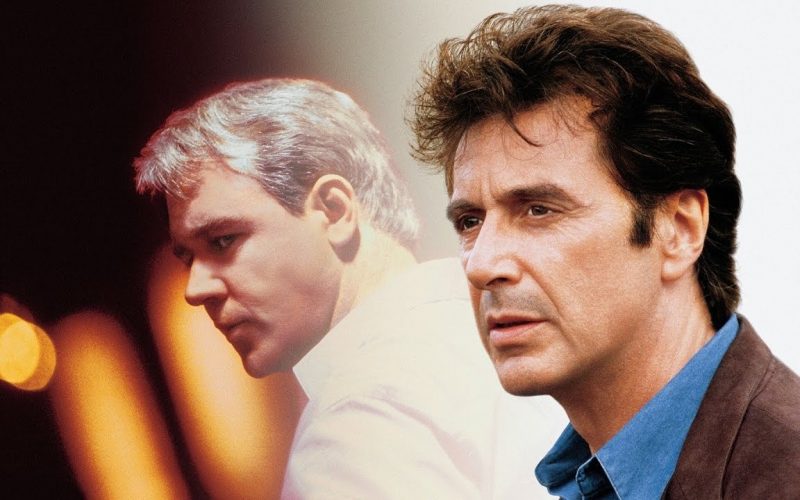Michael Mann Lights Up The Big Screen – The Insider (1999).
“Everything interests me.”
In the 1980s Michael Mann directed three theatrical feature films; Thief (1981), The Keep (1983), and Manhunter (1986). None of these films made a major impression at the time, either commercially or critically, though Thief and Manhunter have, in recent years, attained a strong following among cinephiles. In stark contrast, the reception that greeted Michael Mann’s 1990s output ranged from favourable to ecstatic.
The decade kicked off with The Last of the Mohicans (1992) which proved to be Mann’s biggest commercial success to that point in his career, as well as being well received critically. Heat followed in 1995, a film which many would argue is the high point of Mann’s career and is one that proved to be highly influential having been beautifully homaged in Christopher Nolan’s The Dark Knight (2008). Mann rounded off the ‘90s with The Insider (1999), a film which failed to set the box office alight but did receive near-unanimous critical acclaim.
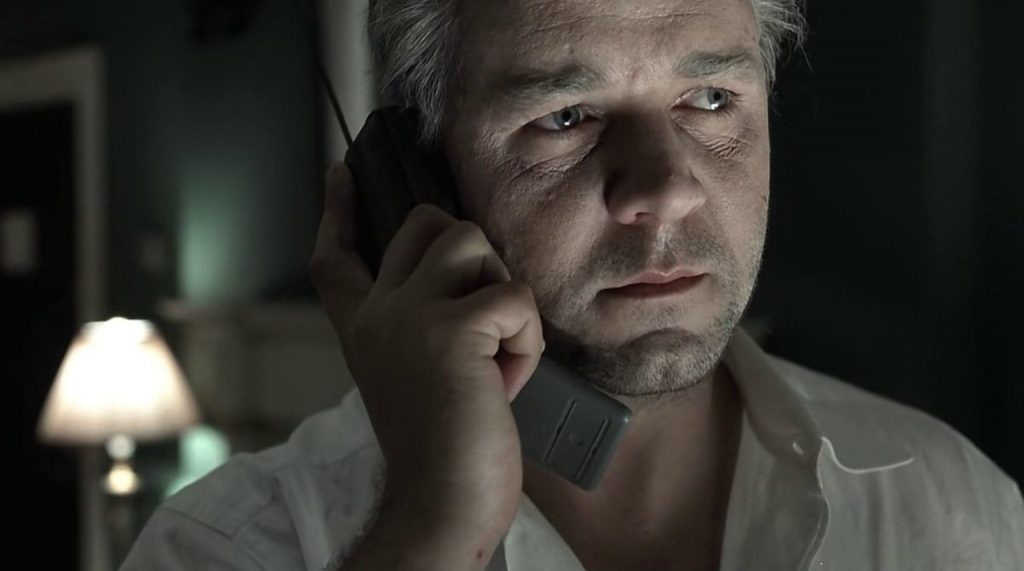
The genesis for The Insider can be traced back to Mann’s friendship with Lowell Bergman, a producer for the 60 Minutes current affairs TV programme. Mann and Bergman had long discussed the idea of Mann developing a film based on one of Bergman’s investigations (in particular an arms dealer based in Marbella) but none of the proposed ideas came to fruition. It was during post-production on Heat that Bergman confided in Mann about his then-current experience of working on a 60 Minutes episode featuring an interview with former tobacco executive turned whistleblower, Jeffrey Wigand. Bergman was having difficulties both with Wigand’s former employers (Brown & Williamson) and Bergman’s own bosses at CBS. Mann instantly saw the cinematic potential in what Bergman was telling him and told his friend that they should forget every other idea they had discussed.
The result is an incredibly engaging film that deals with the relationship between two very different men; Bergman (Al Pacino), the world-weary and streetwise 1960s radical turned TV producer/journalist and Wigand (Russell Crowe), the scientist who had worked for a tobacco company but was fired for questioning his employer’s internal practices. What brought the two men together was their common impulse to tell and share the truth.
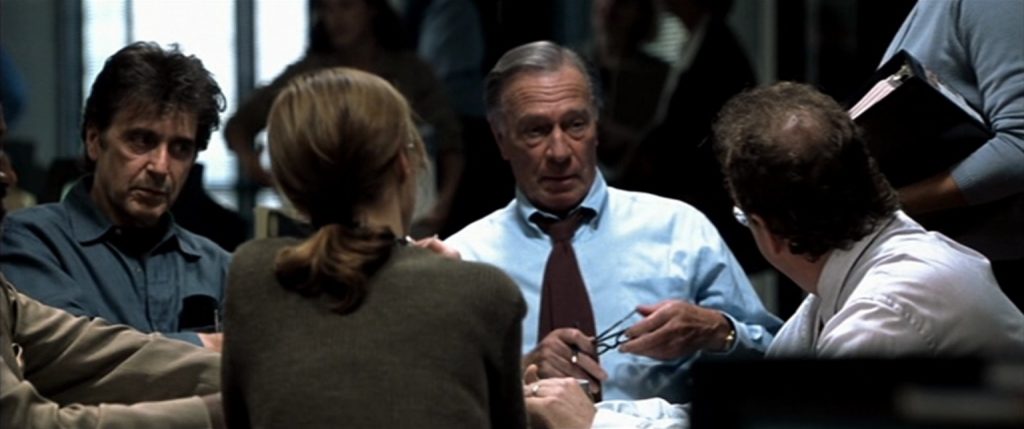
While this may not sound like a particularly dynamic tale, in the hands of Michael Mann it became one of the finest dramas of the decade. For me, The Insider truly demonstrates Mann’s brilliance as a director. The film is pretty much a succession of dialogue-heavy scenes, many of which are phone conversations, but it moves with a terrific pace for all of its 157 minute running time and never gets dull despite an inherent lack of action (though Mann manages to make a scene of Bergman and Wigand exchanging fax messages tense and exciting.) Mann has described the narrative structure of Heat as being comprised of “verses and choruses” with the ‘verses’ being dialogue scenes involving the characters’ domestic and personal lives while the ‘choruses’ are the action scenes on the street. To borrow that analogy then, The Insider is made up of only ‘verses’ that cover the characters’ private and professional lives.
Mann’s well-known quest for authenticity in his films reached its logical conclusion with The Insider as it was his first film to deal directly with actual people and events (he has referred to the extensive research conducted for each film as being like anthropology.) To that end he filmed in the real locations where some of the events took place such as the hotel room in which Bergman and Wigand first meet and the courtroom in Mississippi in which Wigand gives his deposition. Mann also cast the Attorney General of Mississippi, Michael Moore, and Private Investigator, Jack Palladino to play themselves in the film. These choices only add to the film’s extraordinary sense of authenticity, something which typifies the best of Mann’s work.
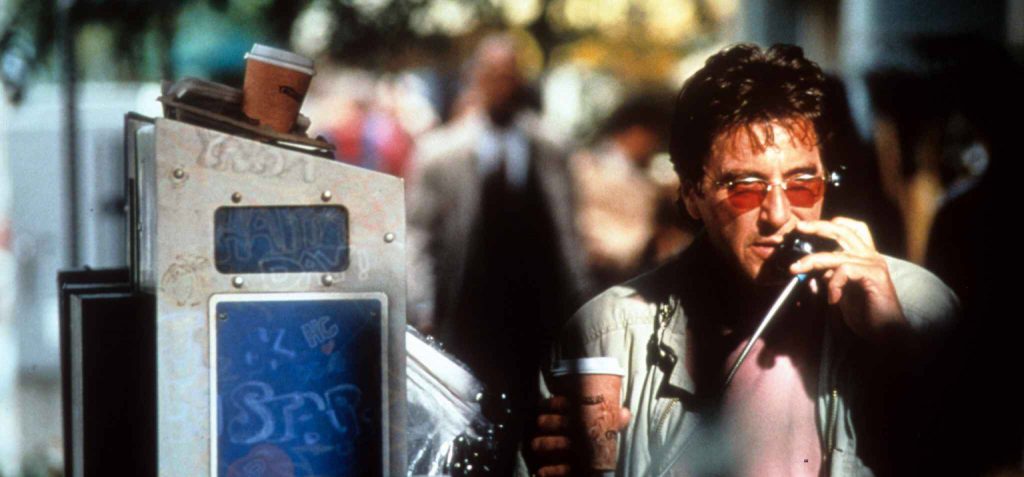
The cast is uniformly excellent and when The Insider was released much of the praise was focussed on Russell Crowe and Christopher Plummer (the latter portraying 60 Minutes correspondent, Mike Wallace). Both put in sterling performances but Al Pacino’s performance as Lowell Bergman ranks among his very best. Pacino has many highlights in The Insider but the choice scene for me is the one in which he confronts 60 Minutes Executive Producer, Don Hewitt (Philip Baker Hall) after pressure is applied to suppress the episode featuring Wigand’s interview. Journalistic integrity and caution collide as Pacino does what he does best, berating Hewitt with the question, ‘What are you? Are you a businessman or are you a newsman?’
It would be difficult to discuss a Michael Mann film and not mention his use of music. The main composers for The Insider were Pieter Bourke and Lisa Gerrard, though much of the soundtrack was augmented with tracks from a number of other musicians. Bourke and Gerrard’s standout track is ‘Meltdown’, which plays over the scene in which Wigand, sat in his hotel room after his marriage has broken down due to the stresses of his actions, imagines that he can see his two daughters in a garden. Other notable mentions go to the Gustavo Santaolalla instrumental ‘Iguazu’ and the Massive Attack number ‘Safe From Harm (Perfecto Mix)’ which closes the film brilliantly.
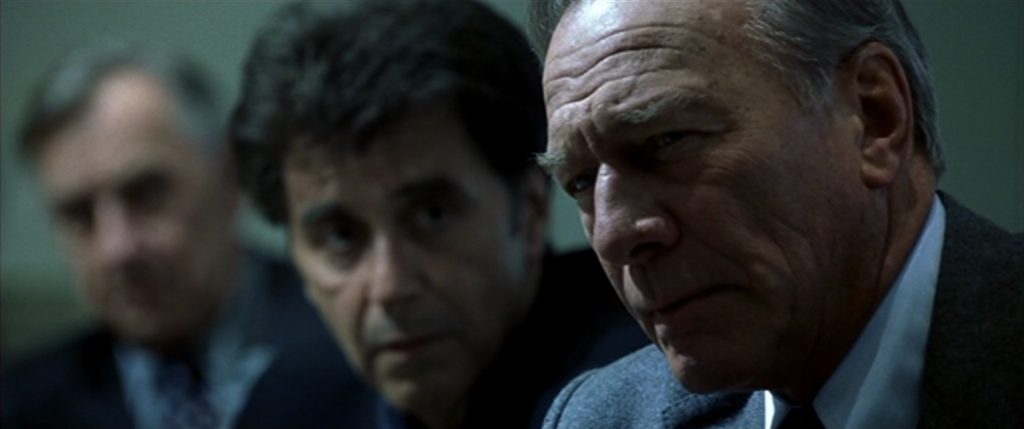
The film’s final scene is a conversation between Lowell Bergman and Mike Wallace in which Bergman informs Wallace that he has resigned from 60 Minutes. Just before the revelation, Wallace asks Bergman if he is still interested in a story in Canada that is referred to earlier in the film. Bergman’s answer is, “Everything interests me.”
This is a statement that could come directly from Michael Mann himself. It is clear from his body of work that he strives to represent any particular piece of chosen subject matter in as authentic a fashion as possible and to not merely make films that are derivative of other films (indeed, Heat and The Insider are both based upon first-hand experiences that friends of Mann told him about.)
Twenty years on from its release, while The Insider may remain an often forgotten piece of work from a director with no shortage of standout movies in his filmography, it is undoubtedly a towering achievement.
Film ‘89 Verdict – 10/10

